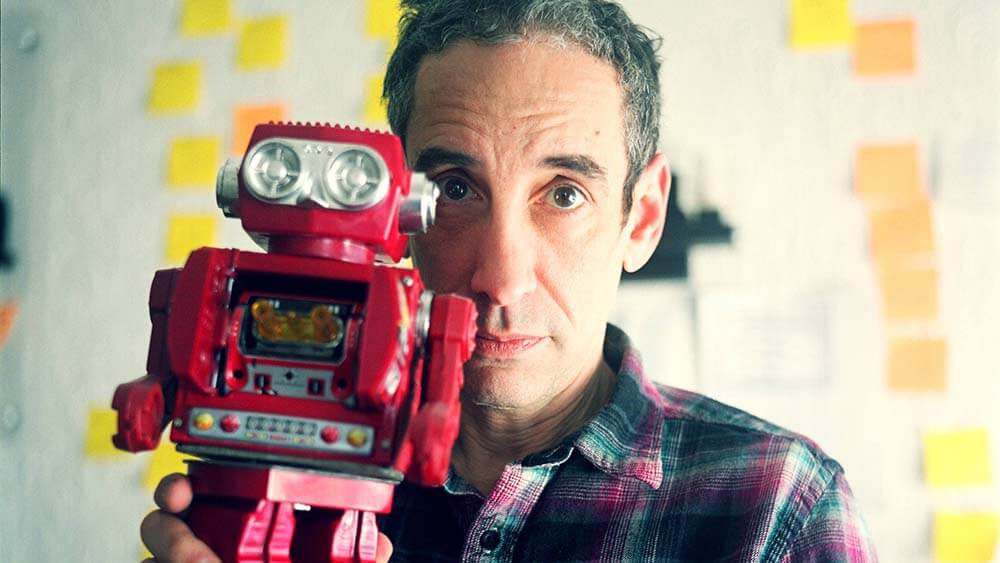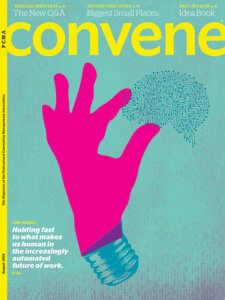
As artificial intelligence develops, the real threat is not that we will lose our jobs to robots, author Douglas Rushkoff predicted in 2019. “The real threat is that we will lose our humanity to the value system we embed in our robots, and that they in turn impose on us.” (Iain Marcks/WGBH)
‘Let’s take a peek into the future. You might want to buckle up.’
When we used those words to introduce Convene’s August cover story in 2019, we had no way of knowing just how bumpy things would become barely six months later as COVID spread across the globe. But the turbulence we were referring to was artificial intelligence and the impact that it will have on our work and our lives. And has often been noted, one of the impacts of the pandemic is that it has only accelerated digital transformation.

In our August 2019 issue, we wrote about the impact AI will have on our lives and work.
In 2019, we talked to media theorist Douglas Rushkoff, who argued in his 2019 book,Team Human, that technology was putting what it means to be human at risk.
The internet began as a medium that acted as a force for human connection and expression, Rushkoff wrote in Team Human, but technology platforms “were no longer in the business of delivering people to one another; they were in the business of delivering people to marketers.” And as artificial intelligence develops, the real threat is not that we will lose our jobs to robots, predicted Rushkoff. “The real threat is that we will lose our humanity to the value system we embed in our robots, and that they in turn impose on us.”
A March 22 letter signed by more than 1,000 technology leaders and researchers, including Elon Musk and Center for Humane Technology Executive Director Tristan Harris, urged AI Labs to pause advanced artificial intelligence labs, citing profound risks to society and humanity. The number of signatories to the letter has now grown to 50,000 (Rushkoff was not among them).
The pause would create space to come up with shared safety protocols for safety, the letter said. We should be asking ourselves, “Should we let machines flood our information channels with propaganda and untruth? Should we automate away all the jobs, including the fulfilling ones? Should we develop nonhuman minds that might eventually outnumber, outsmart, obsolete and replace us? Should we risk loss of control of our civilization?”
“It’s time to reassert the human agenda,” Rushkoff wrote in 2019. “And we must do so together — not as the individual players we imagine ourselves to be. … Being human is a team sport. As much as we think we’re separate individuals, we’re wired from birth and before to share, bond, learn from, and even heal each other.”
When Convene asked Rushkoff about the role that events could play in human connection, he said:
“Events bring real people into real spaces with one another. I believe that social reality is not a superstition. I think if people existed alone in little boxes, their lives would have less meaning, purpose, and discovery than if we are allowed to talk to other people in the real world. Likewise, the members of a community of interest deserve the opportunity to meet and engage with one another in real life.
“They can share skills and experience, not just through text or video, but through what is known as ‘mimesis.’ We imitate one another. We should be able to see what it is like to be an expert in our field. We should get to be with them and model their approach and behavior. We should be rewarded by our peers, who understand what we are going through better than anyone else. We deserve not to be alone.”
Barbara Palmer is deputy editor of Convene.
